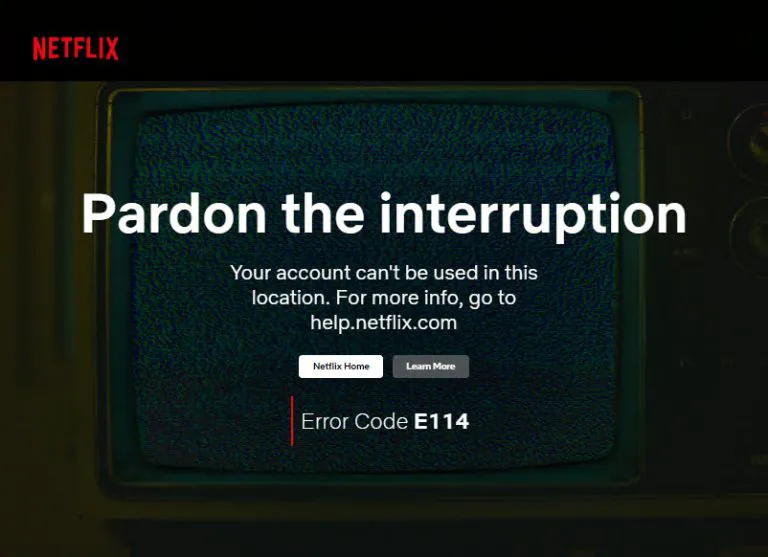How to Find My Previous Addresses in 2025 | 6 Proven Methods
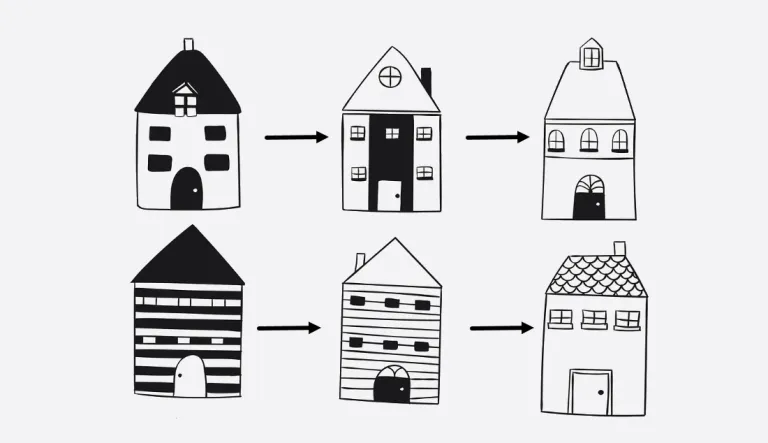
Many of us have probably been in situations where we’ve had to list all our previous addresses. This usually happens when submitting crucial applications, such as applying for a new job that requires a thorough background check. And sometimes, they want addresses from 7 years ago, 10 years ago, or even further back!
Finding a complete list of your previous addresses can be a daunting task, especially if you’ve moved around a lot or need addresses from decades past. Fortunately, memory isn’t the only solution. This guide will walk you through various online and offline resources and methods to effectively uncover your past addresses.
Methods to find my previous addresses 
I want a quick way to find as many old addresses as possible:
I want the highest accuracy and am not afraid of putting in time and effort:
Other methods that are worth trying:
And even if you’ve tried everything and still can’t find the full address list, it’s not the end of the world: what your addresses may be used for matters.
Method 1. Pull your credit report
Your credit reports aren’t just for checking your credit score; they can also reveal your past addresses. Indeed, your address is an essential part of your credit information and is included in your credit history.
Why do previous addresses appear on my credit report?
The addresses listed on your credit report are there because they have been reported to the credit bureaus by current or past creditors with whom you have had financial dealings. These addresses typically include places where you have previously received bills or conducted financial transactions[1].
The three nationwide credit bureaus — Equifax, Experian, and TransUnion — have a centralized website, so to get your report, just head over to annualcreditreport.com. The website allows you to pull your free weekly online credit reports from each of the three credit bureaus.
Just follow the on-site instructions and the 3 steps outlined in the image below to claim your free report. (You’ll need to provide personal information for verification, such as your name, Social Security number, and date of birth, and answer some questions that only you would know.)

Once you access your credit report, there should be a section listing your current and previous addresses associated with your credit accounts. This section might be called ‘Addresses Reported,’ but the name and layout can vary slightly between credit bureaus.
Read more: The Federal Trade Commission (FTC) offers detailed guidance on obtaining your free credit report.
Here’s a tip: We advise that you obtain credit reports from different agencies (Equifax, Experian, TransUnion) to ensure broader coverage.
I suggest starting with reviewing your credit report as it’s a good starting point. It works very well because almost everyone has a credit account, and as official records, credit reports are usually accurate and reliable. Plus, you can get them online and at no cost. However, if you didn’t have any credit cards back in the day, running a credit report wouldn’t be much help.
Will checking my credit score impact my credit score?
No, checking your own credit report or score (a soft inquiry) does not affect your credit scores. Only hard inquiries, typically from lenders during credit applications, can potentially affect your scores temporarily.[2]
What if I found inaccurate address information on my credit report?
While credit reports are generally reliable sources of address information, information might be outdated or incomplete if creditors haven’t reported your addresses promptly. If you identify any discrepancies or inaccuracies in your personal or address information, contact the credit bureaus and the business that supplied the information to get the mistakes removed from your report.[3]
Your feedback can help us continuously improve our articles. And rest assured, your response is completely anonymous. (If you chose “others”, feel free to share your unique story in the comments section)
Method 2. Search your online accounts
One often overlooked yet surprisingly effective way to find previous addresses is through your online shopping records. If you’re someone who shops online frequently, chances are you’ve left a trail of delivery addresses across various e-commerce platforms such as Amazon or eBay. By checking your order details/account information, you might uncover a detailed list of old addresses, including street address, apartment number, city, state, zip code, and even specific door numbers. While it may not capture every place you’ve lived, it can certainly fill in the blanks in your address history, especially those that you might have forgotten.
The usefulness of this method depends on your online shopping habits.
The more frequently you’ve ordered items to different addresses, the more comprehensive your address list will be. (But who knows, maybe you happen to have made a purchase during the specific time period you’re trying to trace 🙂
Open your mind and expand your search
Remember, it’s not just Amazon that can provide residential history. Depending on your spending patterns, there are other unexpected sources that might help. If you often order food delivery or use grocery services, apps or websites like DoorDash, Uber Eats, Walmart, Costco, or even Domino’s Pizza may have records of your addresses. And if you frequently take rides home, don’t forget to check Uber as well.
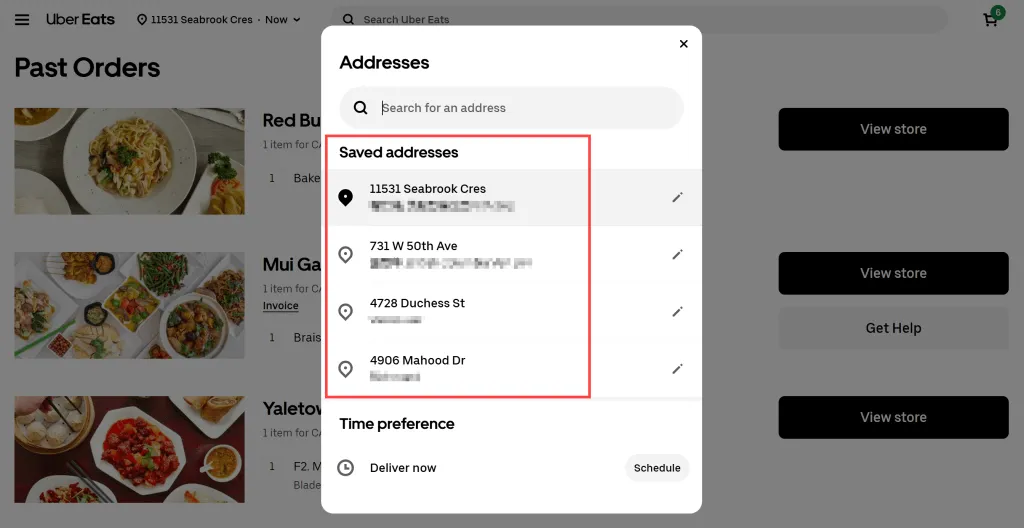
Pro tip: If you have a vague recollection of an address but can’t quite recall the specifics, there’s a quick and easy way to search for it: take advantage of your frequently used email account. Simply enter any fragment of the address you remember, and you’ll likely find order confirmation emails from Amazon or other platforms that list your shipping address. An added benefit of this method is that it might also surface previous rental agreements or other documents that contain your old addresses.
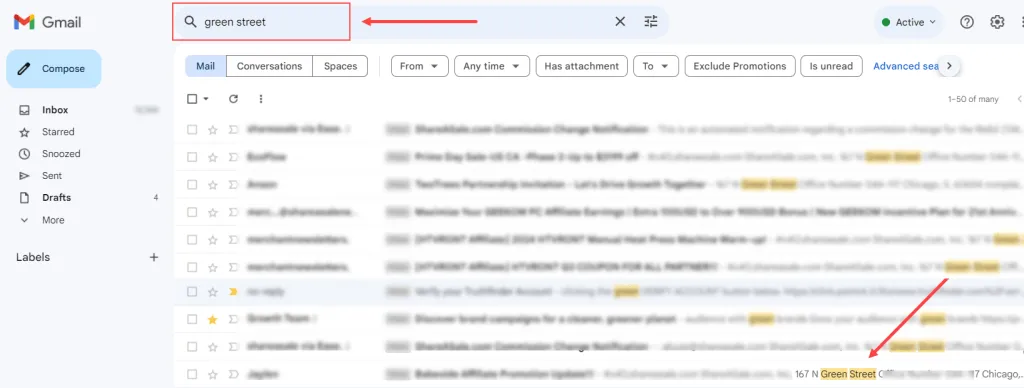
Method 3. Use people search engines (recommended)
If the methods mentioned above didn’t work perfectly for you, or you want a quick way to find as many old addresses as possible, you may try using people search engines.
These websites aggregate a massive amount of data from different sources, including federal, state, and local government public records. One of the most common features of these sites is name search, where you can obtain a detailed individual report, including address/location history[4], simply by entering a name.
Advantages of using a paid people search engine to retrieve your previous addresses include:
After trying out several people search tools, I found BeenVerified to be my favorite. Its relatively more detailed results and a generally higher success rate in finding the correct matches set it apart from many other products. I also appreciate how user-friendly its reports are—they’re easy to understand and well-organized. It distinguishes between “top matches” and “higher confidence data”, which can help in assessing the reliability of the information.
To get your report, go to BeenVerified’s Name Lookup page, enter your full name, and click SEARCH.
During the search process, you might be prompted to provide some extra information (like your state) to narrow down the results, especially if there are many people with the same name as yours.
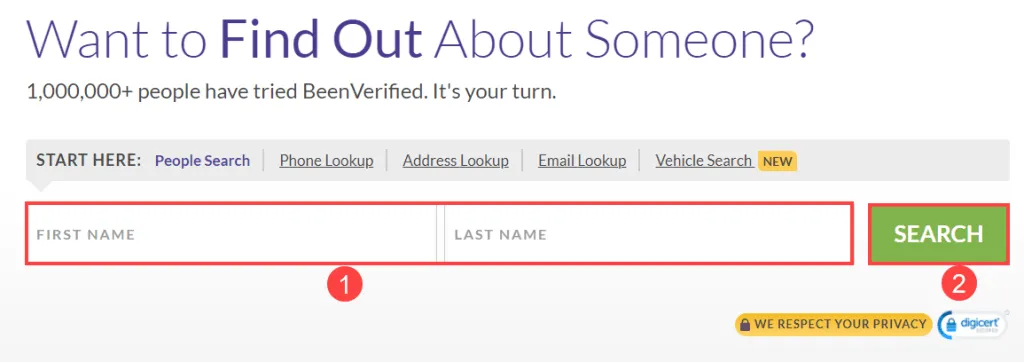
TruthFinder offers another viable option, with results often overlapping with BeenVerified. A unique advantage of TruthFinder is its ability to pinpoint residency dates to the exact day, while BeenVerified’s reports typically specify dates to the month. (Both BeenVerified and TruthFinder require a membership to view detailed reports.)
Is the information provided by these tools 100% accurate?
It’s important to acknowledge that while these tools can uncover a vast array of records, they cannot guarantee 100% accuracy. This may result from incomplete public information or imperfect data matching algorithms.
Despite these limitations, the value of these tools lies in their ability to quickly provide you with as many potential addresses as possible, or at least give you some hints, facilitating the identification of missing addresses and potentially piecing together a comprehensive address history. You can further review and verify the results yourself, after all, you’re very likely to tell whether or not you’ve lived in a particular place listed on the report.
You might be wondering: are there any free alternatives?
There are numerous people search services available online, and some of them are indeed free. These free people search sites typically allow you to view partial address histories for free, such as TruePeopleSearch. However, from my own experience using it, I found that it provides very limited information. For example, when I search for a certain person(the same as in the sample report above), the site only shows one current address (screenshot below).
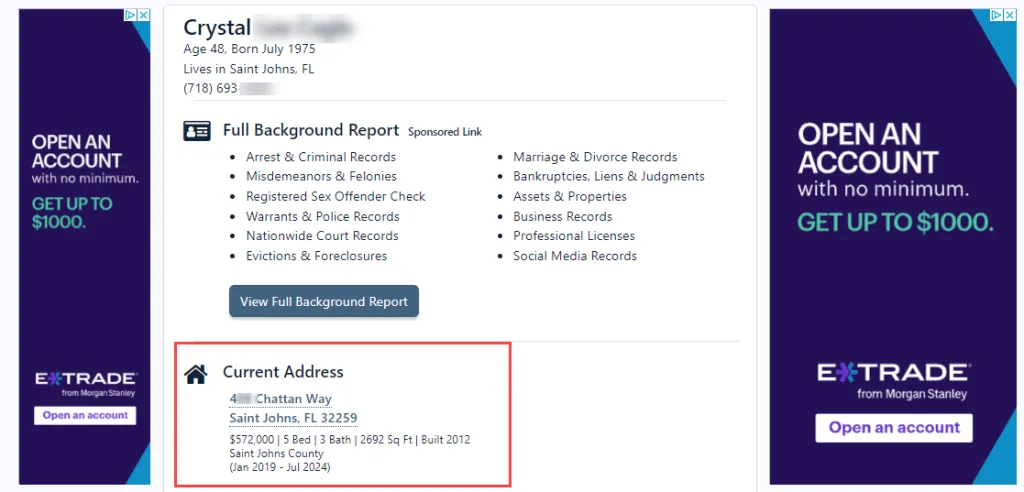
Therefore, free tools are not the most recommended option here, but if you’d like, there’s no harm in giving them a try.
Hey, let’s take a moment—we care about your personal experience. If you’ve tried getting your credit report, did you run into any issues during the process? Did it help you find all your previous addresses, or did the people search engines work better for you? Feel free to share your thoughts in the comments section at the end of this article—we’d love to hear from you and discuss it together!
Method 4. Review your tax records
If you usually keep a habit of saving every tax report you receive, you can simply find them and check for previous addresses. But if you don’t have this habit (like many people), or if you’ve moved frequently and lost those old documents, you can still request copies of your tax records from the IRS.
Request a tax return transcript online
The IRS offers free tax transcripts on its website, however, they only show the first six characters of past addresses and covering the current tax year plus the previous three years. If this is enough for you, you can visit the Get Transcript page on the IRS website to obtain one.
Request a tax return transcript by mail
If you need a longer or more complete history of addresses, you have another option, although it’s a bit more cumbersome: You’ll need to fill out Form 4506 (available on IRS.gov) and mail it to the local IRS office indicated on the form. Note that there’s a $30 fee for each return requested[5].
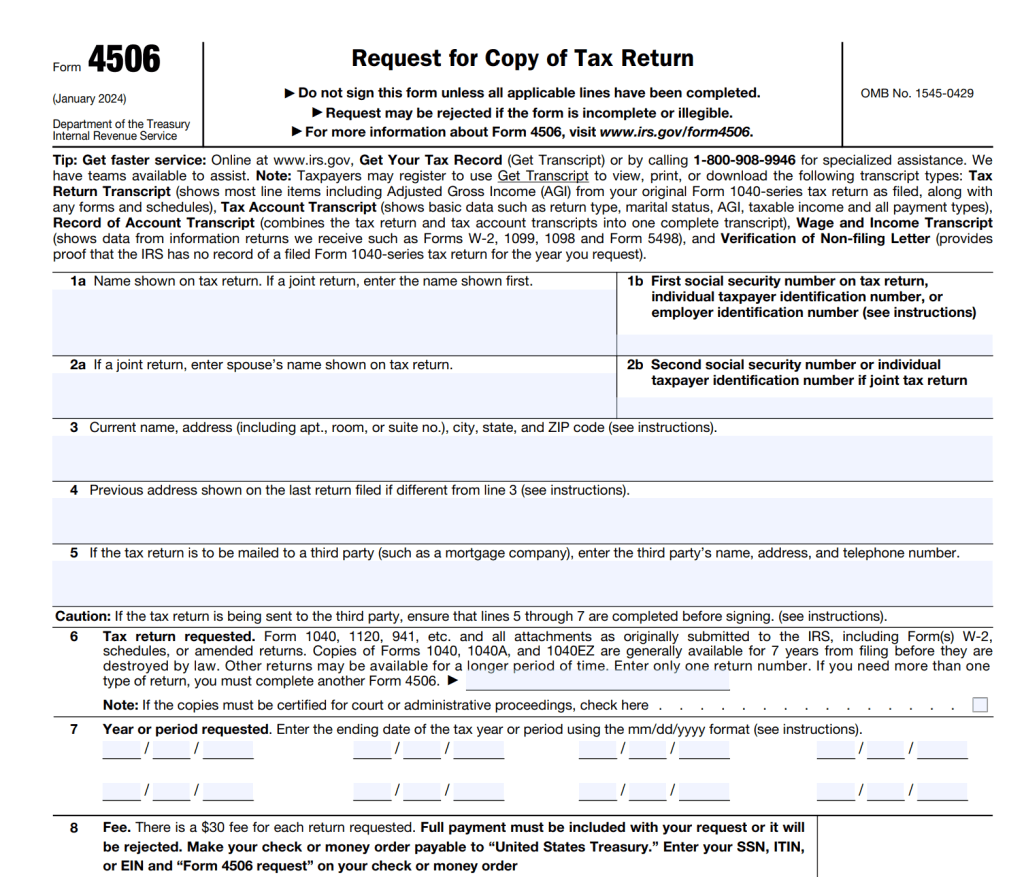
Similar to the first method, this approach also gets address information through official channels, so it’s pretty accurate. However, it may not be as convenient or straightforward, and there could be fees involved. If you prefer avoiding the hassle or waiting time (transcripts arrive in 5 to 10 calendar days according to the IRS), you might want to consider using a people search engine.
Method 5. Check old documents
Your old documents hold a wealth of information, including those elusive past addresses.
For addresses from distant times, such as your middle school days, consider checking school records. While the retention period for such records may vary, it’s worth exploring.
Other old documents that may hold address clues include:
- Employment contracts
- Paystubs
- Rental contracts
- Bank statements
- Medical records
- Utility bills
This method is particularly well-suited for those who meticulously maintain their records (like myself, an avid collector of receipts and documents). However, if you’re not in the habit of preserving old paperwork or have experienced frequent relocations with misplaced documents, this method’s effectiveness may be limited.
Method 6. Seek help from your loved ones
Sometimes, addresses that you might not remember yourself could be recalled by your family members, your partner, or your close friends, so don’t hesitate to ask them. This may also introduce an element of cross-checking and verification. After all, human memory can be fallible, and multiple perspectives can enhance the accuracy of your address history. For example, there was a Quora user who asked their mom for help. She was able to quickly recall the addresses from their childhood and college days, which was a huge help.
I hit up my mom. Mothers seem to have this weird superpower where they can recall tiny details like that even decades later. She was able to rattle off the addresses from my childhood and college days, which was a huge help.
What if I’ve tried everything and still can’t find my full address list?
Well, it happens. Despite trying all the possible methods, you may still find yourself grappling with incomplete address records, or simply unable to recall the exact door number. This can be a source of anxiety, which I totally understand, especially when it involves something as important as job applications, immigration forms, or mortgage requests. But don’t panic, it’s important to think about what your addresses may be used for ultimately.
When an employer or a public institution asks for your address history, it’s usually for a specific reason, most commonly for a background check. In a criminal background check, for instance, the company conducting the check needs to know your past and current addresses to determine which jurisdictions to search for potential criminal records. This typically involves searching state and county databases. Verifying your identity is another common purpose, since many people may share your name. Your address can serve as a piece of personal identifying information, helping to connect you with any official records they may uncover.
Here’s a simple yet important tip I want to share:
From my personal experience and that of my friends, being honest and transparent when filling out address history forms is key.
If you can’t remember everything perfectly, just do your best to fill in as much as you can. Also, try to avoid leaving any significant gaps, especially if it’s explicitly stated as a requirement.
Always refer to the specific requirements set by the organization requesting your address history. If there’s any ambiguity or you have concerns, don’t hesitate to reach out via email or phone to clarify the details. For example, you might ask whether they want your exhaustive residential history or just recent addresses, and if they need all places you’ve ever stayed (including Airbnb rentals or staying with friends) or only addresses where you received mail.
For instance, a medical school applicant posted on a forum about receiving a Certiphi background check email, and she expressed anxiety due to difficulty recalling past addresses[6]. Following advice from fellow forum members, she contacted Certiphi and was informed that for educational background checks like AAMC, they don’t care how many old addresses you put in. So, the worrying turned out to be unnecessary.
Can the USPS help me find my previous addresses?
United States Postal Service (USPS) may be the first thing that comes to mind when looking for your address history. However, according to many users’ experience, it actually can’t be of much help.
Contrary to what you might think, USPS doesn’t have a mysterious national database that keeps track of where everyone lives. Their service focuses on mail delivery, not maintaining personal address history. They wouldn’t typically store your addresses for extended periods. What they do offer is a temporary forwarding service to reroute mail from your old address to the new one.
Conclusion
The methods outlined in this guide offer practical ways to find your previous addresses. While each method has its limitations, combining several approaches can increase your chances of compiling a comprehensive list. Also, which one works best often depends on your own situation and why you’re looking for these addresses. Remember, it’s important to be open and straightforward when giving your address history. Also don’t hesitate to seek clarification from the requesting organization regarding their specific requirements.
After going through this search process, you can also gain some experience for the future: try to keep track of important stuff, like keeping a record of all your old addresses and when you lived in each. Personally, I’ve found this helpful many times, and it’s as easy as updating a text file every time you move.
All product names, logos, brands, trademarks and registered trademarks are property of their respective owners.
Reference
- Experian. (April 8, 2021). Does removing an old address from your credit report increase your credit scores? Retrieved July 12, 2024, from https://www.experian.com/blogs/ask-experian/does-removing-an-old-address-from-your-credit-report-increase-your-credit-scores/↩
- Equifax. (n.d.). Will checking your credit hurt credit scores? Equifax. Retrieved July 12, 2024, from https://www.equifax.com/personal/education/credit/score/articles/-/learn/will-checking-your-credit-hurt-credit-scores/↩
- Federal Trade Commission. (July 2022). Free credit reports. Retrieved July 12, 2024, from https://consumer.ftc.gov/articles/free-credit-reports↩
- The address information in the report typically comes from sources like Voter Registration history or Property Records.↩
- As of the time this article is published↩
- PreMed Communities [Eccesignum]. (Jan 5, 2016). Certiphi — Addresses Issue [Online forum post]. Student Doctor Network. https://forums.studentdoctor.net/threads/certiphi-addresses-issue.1177407/↩

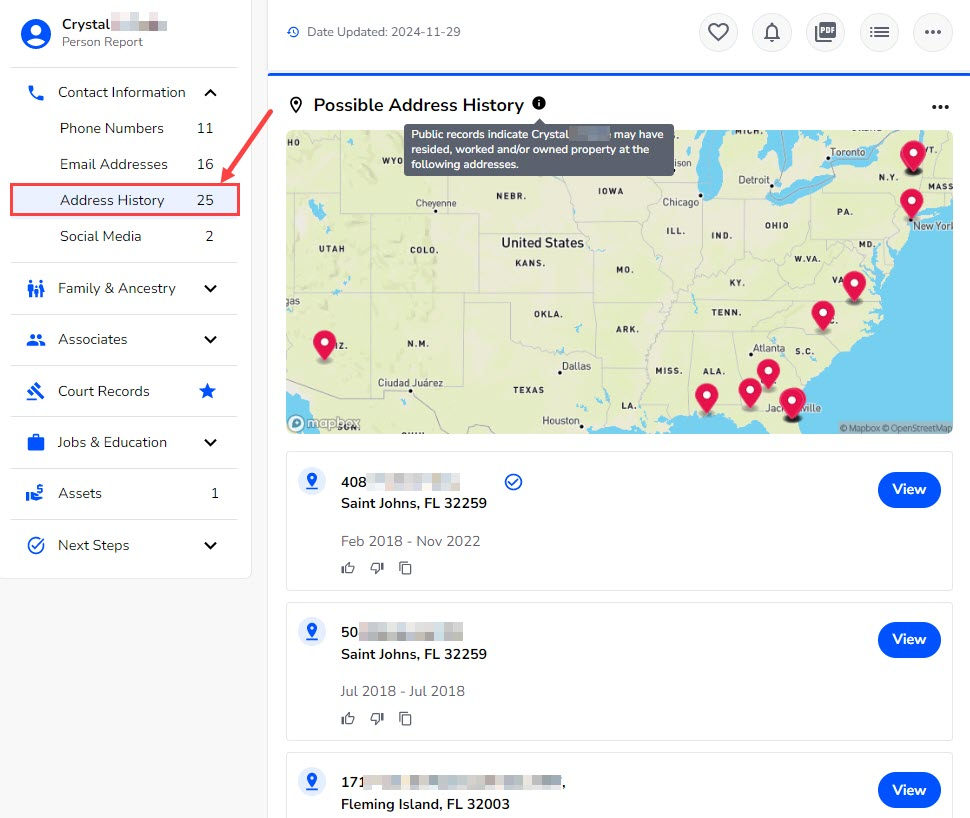

 View all of Jocelyn Sun's posts.
View all of Jocelyn Sun's posts.


